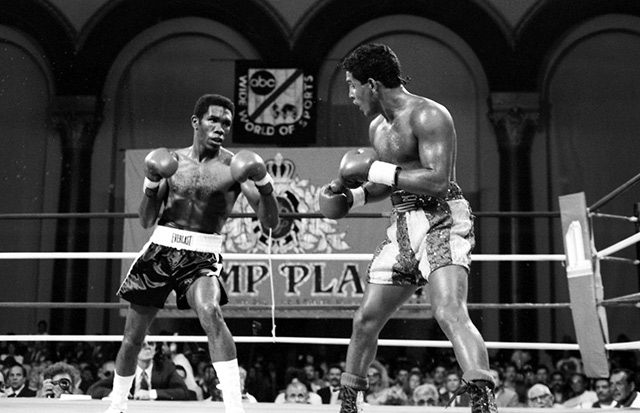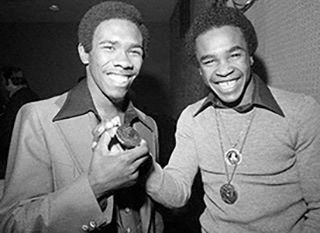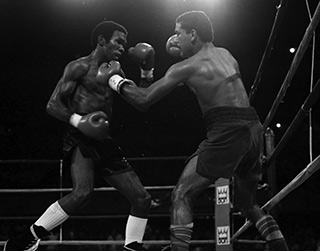Howard Davis Jr.: 1956-2015


Howard Davis Jr. squares off with Hector Camacho during their nationally televised junior welterweight bout in 1987. Photo / THE RING
Everybody liked Howard Davis. He had a warm way about him and was a nice guy.
Davis won four national Golden Gloves titles and an amateur world crown. He vaulted into the public consciousness at the 1976 Olympics in Montreal.
Five American boxers won Olympic gold medals that year. Davis (who reigned supreme at 132 pounds), was awarded the Val Barker Trophy as the outstanding fighter of the 1976 games.
Putting that achievement in perspective, the other American gold-medal winners were Ray Leonard, Leon and Michael Spinks, and Leo Randolph.
“Winning the gold medal was a moment of mixed emotions,” Davis later recalled. “It meant I’d won the greatest prize in amateur sports. But three days before the Olympics, my mother had died. So even now, the Olympics are a memory tinged with sadness. I was never able to complete the feel-good process about them.”
 Two of Davis’s teammates – Ray Leonard and Michael Spinks — rose to superstardom. Leon Spinks embarked on a roller-coaster ride that included a 1978 upset of Muhammad Ali for the heavyweight championship of the world. Leo Randolph fought professionally for only two years, but captured the WBA junior featherweight title. Of the five gold-medal winners, only Davis failed to win a world crown.
Two of Davis’s teammates – Ray Leonard and Michael Spinks — rose to superstardom. Leon Spinks embarked on a roller-coaster ride that included a 1978 upset of Muhammad Ali for the heavyweight championship of the world. Leo Randolph fought professionally for only two years, but captured the WBA junior featherweight title. Of the five gold-medal winners, only Davis failed to win a world crown.
He came close twice.
In 1980, in Glasgow, Davis challenged Scotland’s Jim Watt for the WBC lightweight title. Watt won a hard-fought unanimous decision by scores of 145-144, 147-144, and 149-142.
Responding to the first loss of his professional career, Davis ran off thirteen consecutive victories. In 1984, he challenged again for the WBC title. This time, the opponent was Edwin Rosario, with the bout in Rosario’s backyard, San Juan.
Rosario started fast, dominating the first three minutes and flooring Davis in the second stanza. But in round three, an overhand right caught Rosario flush on the cheekbone and turned the tide. After eleven rounds, one judge had Rosario ahead by two points and a second favored Davis by three. The third judge, Sid Nathan of Great Britain, had the bout dead-even. The twelfth round would decide.

Davis-Rosario. Photo / THE RING
For two minutes and fifty seconds of the last round, Davis dominated. Then, with ten seconds left, a flash knockdown sent him to the canvas again. That was the difference. By a margin of one point, Rosario retained his title on a 115-114, 117-113, 113-114 split decision.
Four years later, Davis had one more title opportunity, this one an IBF bout at 140 pounds. But he was past his prime and was stopped by Buddy McGirt in the first round.
Let it be noted that each of Davis’s three championship-bout losses was to an elite fighter on the champion’s home turf.
I was friendly with Davis. He was in my home several times. One of those occasions stands out in my mind.
I collect books. Over the years, I’ve amassed a library with more than four thousand volumes. Howard was looking at them one day and his eye was drawn to a seven-book set entitled The World and its People published in 1925. He took Volume One – The Ancient World and Ancient Lands – off the shelf and turned to a chapter entitled “Mesopotamia: The Land of the Beginning.”
“When I think about history like this,” Howard told me, “it makes me feel spiritual.”
Howard Davis was a welcome spirit and a breath of fresh air in the sometimes putrid atmosphere of boxing. He died from lung cancer on December 30 at age 59. It’s sad that he’s gone.
Thomas Hauser can be reached by email at [email protected]. His most recent book – A Hurting Sport – was published by the University of Arkansas Press.














